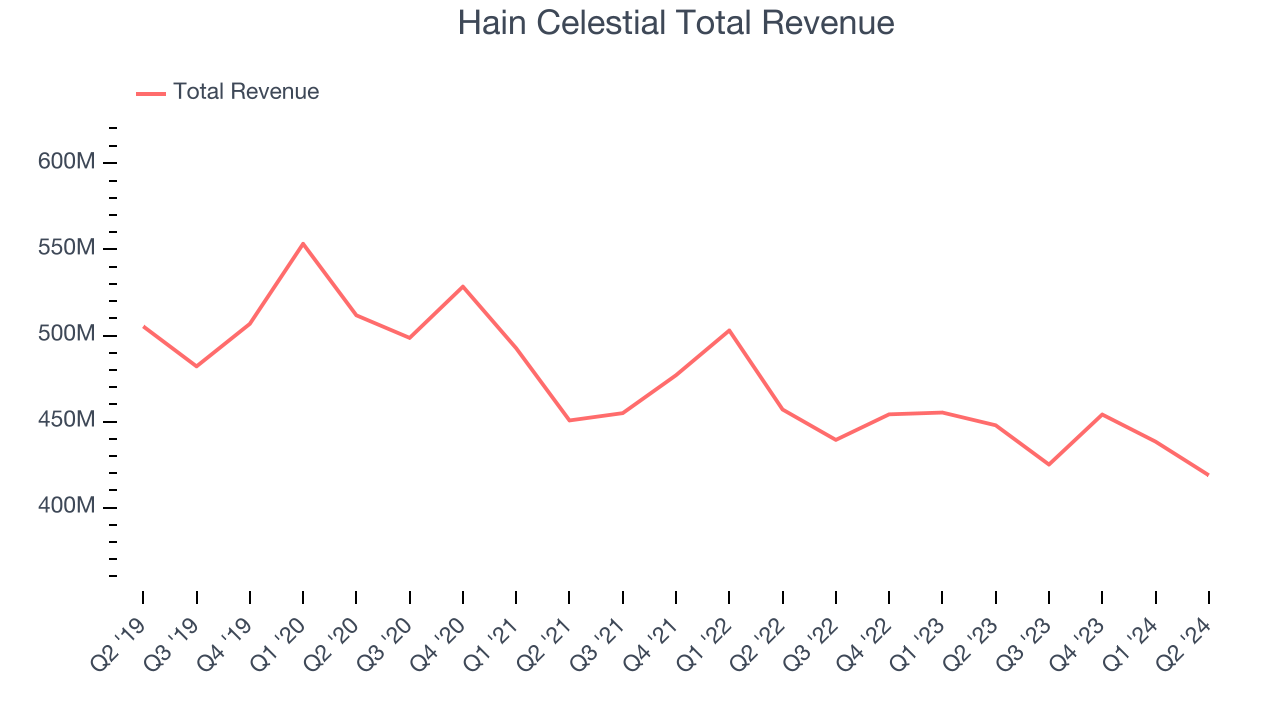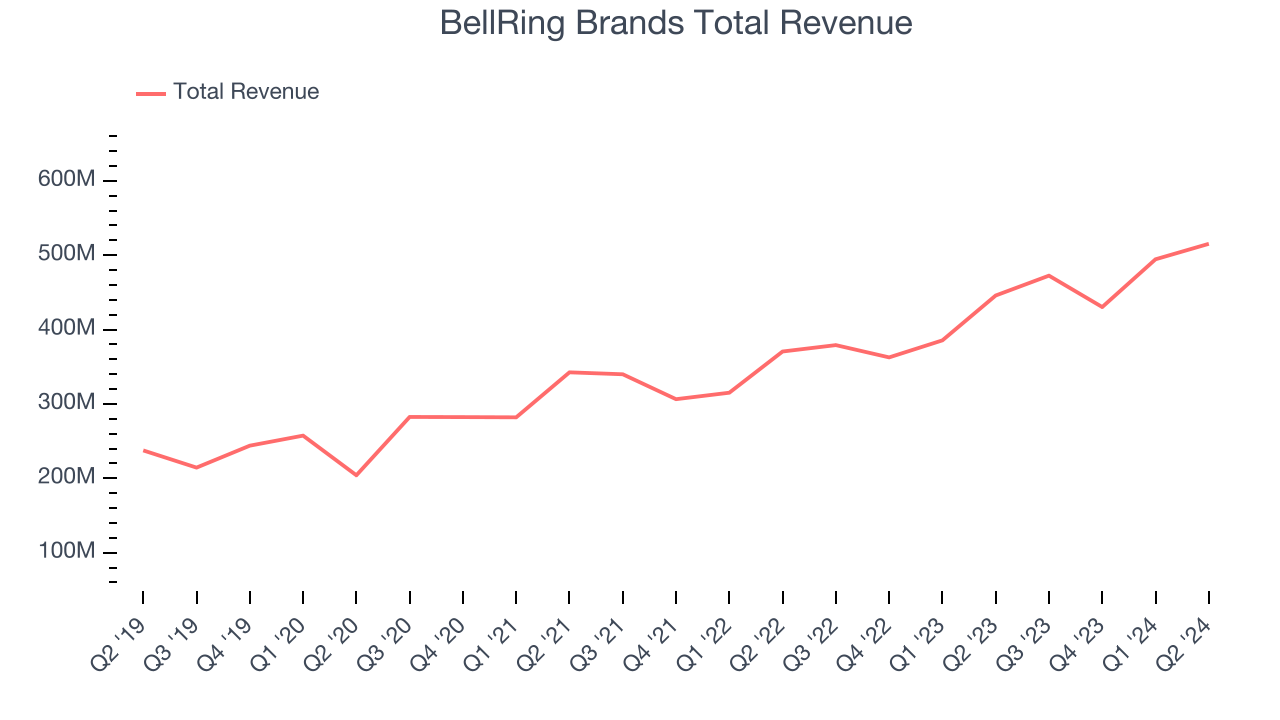Quarterly earnings results are a good time to check in on a company’s progress, especially compared to its peers in the same sector. Today we are looking at Hain Celestial (NASDAQ:HAIN) and the best and worst performers in the shelf-stable food industry.
As America industrialized and moved away from an agricultural economy, people faced more demands on their time. Packaged foods emerged as a solution offering convenience to the evolving American family, whether it be canned goods or snacks. Today, Americans seek brands that are high in quality, reliable, and reasonably priced. Furthermore, there's a growing emphasis on health-conscious and sustainable food options. Packaged food stocks are considered resilient investments. People always need to eat, so these companies can enjoy consistent demand as long as they stay on top of changing consumer preferences. The industry spans from multinational corporations to smaller specialized firms and is subject to food safety and labeling regulations.
The 21 shelf-stable food stocks we track reported a mixed Q2. As a group, revenues missed analysts’ consensus estimates by 0.7% while next quarter’s revenue guidance was 0.7% below.
The Fed cut its policy rate by 50bps (half a percent) in September 2024, the first in roughly four years. This marks the end of its most pointed inflation-busting campaign since the 1980s. While CPI (inflation) readings have been supportive lately, employment measures have bordered on worrisome. The markets will be assessing whether this rate cut's timing (and more potential ones in 2024 and 2025) is ideal for supporting the economy or a bit too late for a macro that has already cooled too much.
Thankfully, shelf-stable food stocks have been resilient with share prices up 6.2% on average since the latest earnings results.
Hain Celestial (NASDAQ:HAIN)
Sold in over 75 countries around the world, Hain Celestial (NASDAQ:HAIN) is a natural and organic food company whose products range from snacks to teas to baby food.
Hain Celestial reported revenues of $418.8 million, down 6.5% year on year. This print was in line with analysts’ expectations, and overall, it was a very strong quarter for the company with an impressive beat of analysts’ earnings and organic revenue growth estimates.
“Fiscal 2024 was the foundational year of our Hain Reimagined strategy, during which we made substantial progress in simplifying our business and generating fuel. We transitioned to a global operating model, reducing geographic complexity and driving scale, and developed a performance-driven, values-based culture,” said Wendy Davidson, President and CEO.

Interestingly, the stock is up 12.6% since reporting and currently trades at $7.70.
Is now the time to buy Hain Celestial? Access our full analysis of the earnings results here, it’s free.
Best Q2: BellRing Brands (NYSE:BRBR)
Spun out of Post Holdings in 2019, Bellring Brands (NYSE:BRBR) offers protein shakes, nutrition bars, and other products under the PowerBar, Premier Protein, and Dymatize brands.
BellRing Brands reported revenues of $515.4 million, up 15.6% year on year, outperforming analysts’ expectations by 2%. The business had an exceptional quarter with an impressive beat of analysts’ gross margin and organic revenue growth estimates.

The market seems happy with the results as the stock is up 22.3% since reporting. It currently trades at $60.39.
Is now the time to buy BellRing Brands? Access our full analysis of the earnings results here, it’s free.
Weakest Q2: Lamb Weston (NYSE:LW)
Best known for its Grown in Idaho brand, Lamb Weston (NYSE:LW) produces and distributes potato products such as frozen french fries and mashed potatoes.
Lamb Weston reported revenues of $1.61 billion, down 4.9% year on year, falling short of analysts’ expectations by 5.5%. It was a disappointing quarter as it posted underwhelming earnings guidance for the full year and a miss of analysts’ organic revenue growth estimates.
Lamb Weston delivered the weakest full-year guidance update in the group. As expected, the stock is down 18.4% since the results and currently trades at $64.11.
Read our full analysis of Lamb Weston’s results here.
McCormick (NYSE:MKC)
The classic red Heinz ketchup bottle’s competitor, McCormick (NYSE:MKC) sells food-flavoring products like condiments, spices, and seasoning mixes.
McCormick reported revenues of $1.64 billion, flat year on year. This number was in line with analysts’ expectations. It was a strong quarter as it also produced a decent beat of analysts’ organic revenue growth and earnings estimates.
The stock is up 23.2% since reporting and currently trades at $83.38.
Read our full, actionable report on McCormick here, it’s free.
Campbell Soup (NYSE:CPB)
With its iconic canned soup as its cornerstone product, Campbell Soup (NASDAQ:CPB) is a packaged food company with an illustrious portfolio of brands.
Campbell Soup reported revenues of $2.29 billion, up 10.9% year on year. This number was in line with analysts’ expectations. Taking a step back, it was a very strong quarter as it produced a miss of analysts’ organic revenue growth estimates.
The stock is down 1.5% since reporting and currently trades at $49.41.
Read our full, actionable report on Campbell Soup here, it’s free.
Join Paid Stock Investor Research
Help us make StockStory more helpful to investors like yourself. Join our paid user research session and receive a $50 Amazon gift card for your opinions. Sign up here.
